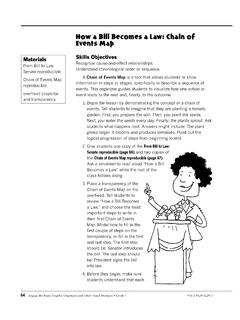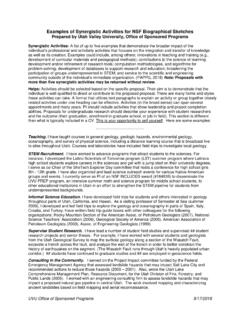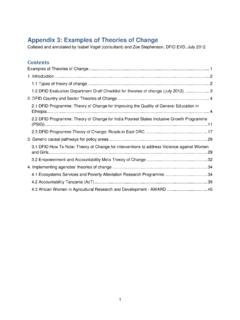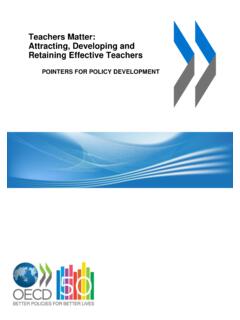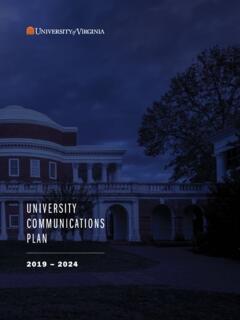Transcription of The Challenges Facing Beginning Teachers - Corwin
1 Bartell 7/21/04 5:45 PM Page 1. 1. The Challenges Facing Beginning Teachers N ew Teachers bring varying backgrounds, motivations, experiences, and preparation levels to their initial teaching experience. Their view of the profession and their role in it is shaped by these motivations, as well as by the context in which they begin their work. This chapter explores the commitments that new Teachers bring to their roles and the Challenges they face. It sets forth the need for the development of a comprehensive induction program to help all new Teachers become fully committed and more effective in the classroom. A CASE OF Beginning TEACHING. Anna was a first-year teacher in an urban school. Although Business was her undergraduate major, she found her initial foray into the business world to be very unsatisfying. She wanted a career that would allow her to make a contribution to society.
2 She heard about the need for Teachers . particularly for math Teachers in her area. Not being quite sure what she needed to do to become eligible to work in a teaching capacity, she attended a recruitment fair put on by the local school district. There she heard about the program that would allow her to begin teaching while she completed work on a teaching credential through a district-led or a university-led alternative certification program. 1. Bartell 7/21/04 5:45 PM Page 2. 2 Cultivating High-Quality Teaching Through Induction and Mentoring After taking a test that measured her basic skills (reading, math, and writing), she was sent on some interviews at several middle schools. She was hired immediately and was told to sign up for a credential program. She was accepted into a program at a nearby university. She chose the university program because she knew she could earn a credential and a master's degree at the same time.
3 However, she knew it would take two or more years, including summers, at a pretty intensive pace. Because she was hired two weeks before school began, she began teaching before she was able to take any coursework. The district put her through a three-day orientation that covered the basics. However, she hardly felt that she was prepared for that first day. She was assigned to teach five math sections, but they required four different preparations and she was required to move to three different classrooms during the day. There weren't enough books for all of her students and she didn't know when they would arrive. She knew about the state standards for students, because they were discussed in her orientation. However, she was perplexed because her students seemed to lack so many of the necessary underlying skills and prior knowledge that would allow them to work at the expected level.
4 She scrambled to find material that was more appropriate to their skills. Anna was assigned a mentor; he was an English teacher who was able to help her understand the expectations of Teachers at her school. However, he did not know much about teaching math. Among her colleagues in the math department, the most senior had been teaching for just three years and was new to that particular school. He had just finished earning his credential. The four math Teachers met together regularly, but they wished they had someone else who was a little more experienced to offer advice about the instructional program. After several months, with the help of her mentor and the math team, Anna felt that she had established some fairly workable classroom man- agement procedures. However, students were not making the progress in math that she had hoped. She assigned homework, but many students just did not turn it in.
5 She called parents, but that did not seem to help. She had difficulty keeping up with all of the demands on her own time. It seemed like she spent many late hours grading papers, planning, and developing new resources. Her classes at the university added to her stress. She was taking two classes back-to-back on Thursday nights. She was having difficulty keeping up with all the readings and assignments. Some of the readings and assignments seemed applicable to her own situation, but many of them did not. Her mentor occasionally stopped in and asked if there was anything he could help her with. She didn't know how to respond to his vague offers of assistance. Although her district offered some new- teacher seminars, she just could not find the time to attend. Bartell 7/21/04 5:45 PM Page 3. The Challenges Facing Beginning Teachers 3. Anna survived a very demanding, stressful first year.
6 However, she wasn't sure if she wanted to return the next year or if she wanted to continue to pursue teaching as a career. THE Challenges OF Beginning TEACHING. Beginning Teachers enter classrooms today with high expectations for themselves and for their students. Yet, we know that the first year of teach- ing is a sobering experience for most new Teachers , and that, over the course of one year, Teachers experience a decreased strength of belief in their own efficacy and in the learning potential of their students (Harris and Associates, Inc., 1991). Nearly every study of retention in the teaching profession identifies the first three years as the riskiest on the job, the years in which Teachers are most likely to leave. The drop out rate is highest among Teachers in hard-to-staff, urban schools, which have the most diffi- culty both attracting and then retaining fully certified Teachers (Ingersoll, 2001; Urban teacher Collaborative, 2000).
7 The early years of teaching are often characterized by a sink-or-swim . or survival mentality because we have often failed to provide for care- ful support and thoughtful development of teaching expertise over time. Beginning Teachers are traditionally expected to assume all the same responsibilities as the more experienced Teachers , and are often assigned the most difficult and challenging students, those that their more experi- enced colleagues do not want to teach. There is no staging or levels of responsibilities as there is in many other professions. It should not be a surprise that new Teachers often speak of just trying to survive during their initial years in the classroom. My first year of teaching was way too stressful. I was not given a curriculum or materials to work with. There were too many kids and not enough desks or books. I really didn't know what I was expected to teach.
8 Second-year teacher Many support programs for new Teachers focus on the teacher who enters the classroom having been through a comprehensive preparation program. Even the most well-prepared Teachers need assistance in applying what they have learned and in moving from a student-teaching situation to their own classroom where they are now fully in charge. For the increasing numbers of teacher who enter classrooms without strong academic and professional preparation, the Challenges are magnified. Bartell 7/21/04 5:45 PM Page 4. 4 Cultivating High-Quality Teaching Through Induction and Mentoring I was hired late, after school started. I missed the early orientation. Because I was the last one hired, I got students taken out of other classes. They really didn't want to leave their friends. I got the kids no one else wanted. First-year teacher This book is written for those who want to change the way all new Teachers are brought into the profession.
9 It is focused on the induction of all new Teachers , but gives special attention to induction in our most challenging settings those where Teachers and their students are least likely to experience success. It will help those who plan and implement induction programs to use strategies that help to retain new Teachers and help them to become more successful in the classroom. THE NEED FOR Teachers . The need for well-qualified, highly competent Teachers has never been greater. Schools nationally will need to hire more than million Teachers to serve growing student enrollments and to replace the considerable number of Teachers expected to retire (National Commission on Teaching and America's Future, 1996). All who prepare Teachers are challenged to produce enough high-quality Teachers to meet the demands. School dis- tricts are making enormous efforts to attract those who are fully prepared to teach or, in many cases, hiring those who may not be qualified but demonstrate the potential to develop teaching expertise.
10 Yet, these prepa- ration and recruitment efforts will not pay off if Teachers are not retained or the new workforce does not help us meet the high standards we are setting for all of our students. The extraordinary need for more Teachers comes at a time in which the demands on Teachers are increasing. Schools are expected to serve an increasingly diverse population and to provide more educational and other services to students and their families than ever before. These new Teachers will teach in a wide variety of contexts and settings. They will teach in urban, rural, and suburban schools. They will teach the rich, the middle class, and the poor. They will teach students who are more ethni- cally, culturally, and linguistically diverse than any country in the world. They will teach students who have strong family support and a caring, nurturing environment, and many who lack this support system.
